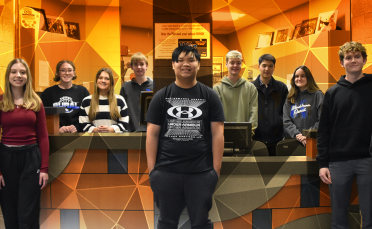Understanding the IPS and How It Helps Your Child Prepare for Post-Secondary Success

You may be hearing the acronym “IPS” used at your child’s school and be wondering what that means. Introduced in 2014, the individual plan of study (IPS) is a tool to help students explore possible future careers. An IPS includes all the processes and products that work together throughout a student’s educational career to help the student make informed decisions about a post-secondary education and career path. Knowing more about the IPS can help parents like you help your child get even more out of the process.
The “I” — individual — is the most important component of an IPS. In education, we’re moving away from “one-size-fits-all” and are working toward a unique plan for each student. Schools across Kansas are all in different stages of implementation of individualized learning, but many schools help students narrow down career interests by:
- Having more flexibility in courses offered
- Offering concurrent credits and opportunities for part-time attendance at technical colleges
- Providing flexible schedules to allow for internships
- Choosing project-based/competency learning assessments
- Providing opportunities to develop leadership experience
In addition, through the IPS process, students complete surveys and assessments to identify their interests and skills, as well as help them learn about and explore the world of work.
We know there are high-demand, high-skilled, high-paying jobs that do not require a four-year degree. We also know there is a shortage of workers to fill many of these jobs and that students can work toward industry-recognized credentials while in high school to help fill these shortages. As educators, our goal is to help students and parents be more aware of these opportunities, in addition to careers that require a traditional bachelor’s degree.
As part of a successful IPS process, students must have opportunities to learn about themselves (their skills and interests) and also about the world of work, including job outlook, education required, skills needed and financial information. The more work-related experiences students take advantage of, the more likely they are to find something that sparks their interest. Work-related experiences can include:
- Taking courses to explore careers and technical fields
- Gaining leadership through clubs
- Participating in athletics
- Volunteering in their schools and communities and
- Participating in job shadowing, internships, interviews of people in various careers, and paid employment.
The IPS process is fluid, so as students learn more about themselves and the reality of various career options, they have the flexibility to change their IPS. Even if their work experiences aren’t in a career field the student is really interested in, they are still learning and practicing valuable, transferable skills. These opportunities also provide a foundation of knowledge, so when students complete interest inventories, they have factual information to help them consider what they do and do not like about the world of work.
In addition to an interest inventory about what students think they would like to do, they also need a way to evaluate their own skills. Club sponsors, parents, teachers and coaches are all great sources of this feedback. Students and employers can also complete an employability skills assessment, such as the one found here.
Another valuable, and less subjective, tool to evaluate workplace skills is the WorkKeys assessment. As part of the Kansans Can vision for the future of public education in our state, the Kansas Legislature appropriated funds to provide one free WorkKeys suite of assessments to all public high school juniors.
Many parents, students and educators are familiar with the ACT test, which is designed to predict college readiness, but they are unfamiliar with the ACT WorkKeys assessment. WorkKeys is a system of foundational skills assessments to help businesses match current or potential employees to the requirements of jobs. If you want to learn more about ACT WorkKeys, please check out my blog on this topic: What Are ACT WorkKeys Assessments, and Why Should Your Child Take Them?
As a school counselor, I feel the main goal of the IPS process is for your child to be able to clearly and confidently communicate to you, their teachers, admissions officers, or potential employers their goals for their life after high school. By the end of the IPS process, your child should be equipped to talk about how they’ve prepared during high school, the skills and attributes they have developed, how those skills transfer to their next step in their plan — continued education or entering the workforce — and where they see themselves in the future.
We know many students will change their plans throughout and after high school; however, with adequate and realistic preparation, the IPS process will help your child make better informed decisions as they transition to post-secondary life. Of course, students will still change their college majors and make career changes throughout their lives, but with a solid IPS background, your child will have the tools at their disposal to more adeptly move through the career development process.

Jina Kugler (BS Secondary Education, MS School Counseling) is currently an Academic Coach for Greenbush Virtual Academy. She served as a professional school counselor at Wamego High School for 20 years and coordinated work keys for the district. Prior to counseling, she taught high school English. Jina serves on a statewide IPS trainers network and coordinates WorkKeys testing for her district. She has also served on the board for Pottawatomie County Economic Development.



